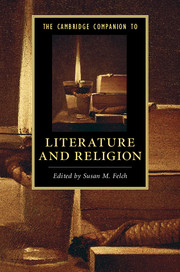Book contents
- Frontmatter
- Epigraph
- Contents
- Notes on Contributors
- Chronology of Religious Founders and Texts
- Introduction
- PART I READING PRACTICES
- PART II INTERSECTIONS
- PART III TRADITIONS
- 9 Hinduism
- 10 Buddhism
- 11 Judaism
- 12 Eastern Orthodoxy
- 13 Roman Catholicism
- 14 Islam
- 15 Protestantism
- 16 World Christianity
- Select Bibliography
- Index
- Miscellaneous Endmatter
14 - Islam
from PART III - TRADITIONS
Published online by Cambridge University Press: 05 September 2016
- Frontmatter
- Epigraph
- Contents
- Notes on Contributors
- Chronology of Religious Founders and Texts
- Introduction
- PART I READING PRACTICES
- PART II INTERSECTIONS
- PART III TRADITIONS
- 9 Hinduism
- 10 Buddhism
- 11 Judaism
- 12 Eastern Orthodoxy
- 13 Roman Catholicism
- 14 Islam
- 15 Protestantism
- 16 World Christianity
- Select Bibliography
- Index
- Miscellaneous Endmatter
Summary
To the Islamic scripture, the Qur'an, language is of central importance. The Qur'an relates how earlier prophets performed miracles to validate their claims to prophecy. Curiously though, Muhammad, the bearer of the Qur'an, never showed any such miracles, even when challenged by his opponents to do so. The only miracle he did present was the Qur'an itself. This fact assumes significance when we remember that the first addressees of the Qur'an were, unlike the believing Israelites addressed by the Torah, unbelieving Arabs. These Arabs were fiercely proud of their linguistic prowess – the word ‘Arab literally means “the articulate,” the non-Arabs being called ‘Ajam, literally, “the dumb” – and their first encounter with the Qur'an was at the level of language or form rather than at that of content or message. What initially impressed the Arabs was the Qur'an's literary beauty, which eventually led them to accept the Qur'an as divine revelation. From the very outset, then, the literary aspect of the Qur'an has been inextricably bound up with the thought of the Qur'an – as borne out by the well-known theological-literary doctrine of the matchlessness of the Qur'an. Understandably, the Qur'an has served, not only for Arabic literature but, derivatively, for Persian, Turkish, Urdu, and other Islamic literatures as well, as a model of literary excellence and has influenced, at several levels, the vast and variegated literature produced in the many Islamic languages over centuries.
A short chapter cannot capture the variety and breadth of Islamic literature. I will, therefore, select two poems, one medieval Arabic and the other modern Urdu, to illustrate aspects of the intricate relationship that exists between language, religion, and culture in that literature. The Wine Ode (al-Khamriyya) by the Egyptian Sufi ‘Umar ibn ‘Ali ibn al-Farid (1181–1235) and Satan's Advisory Council (Iblis ki Majlis-i Shura) by the South Asian poet-thinker Muhammad Iqbal (1877–1938) might appear to belong in different worlds, but they are connected, across time and space, by their preoccupation with a set of themes central to the Islamic religious and literary heritage, with the Qur'an standing at the center of that heritage.
- Type
- Chapter
- Information
- The Cambridge Companion to Literature and Religion , pp. 233 - 248Publisher: Cambridge University PressPrint publication year: 2016



